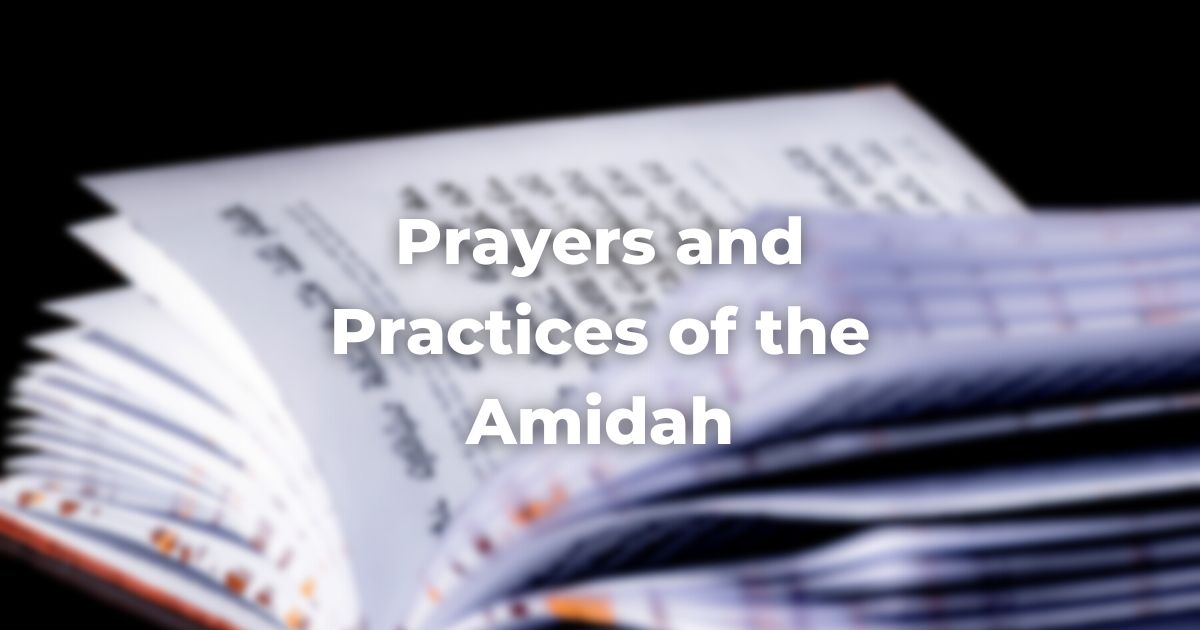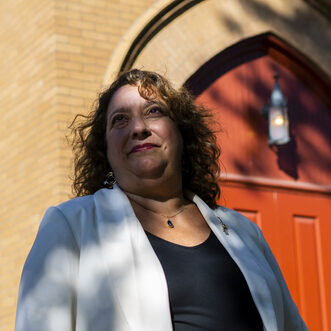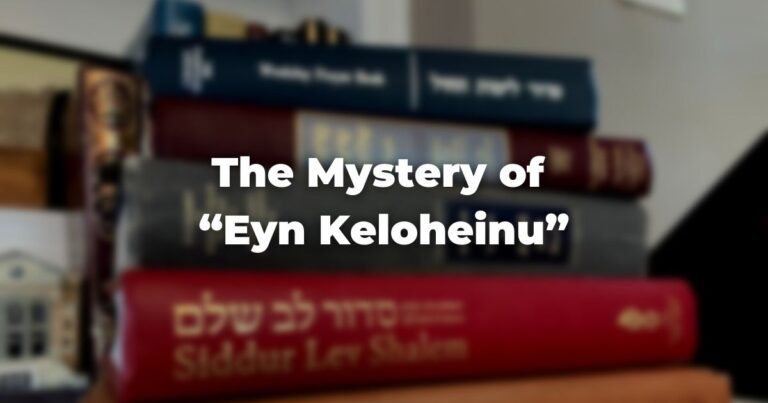Introduction to the Amidah
The Amidah is considered the central part of daily Jewish prayer.
When ancient sources mention the tefillah, with no further qualification, it is invariably the Amidah to which they refer.
This prayer is actually a series of blessings, the original weekday number of which gave it its alternate name: the Sh’moneh Esreih (“Eighteen [Blessings]”). Even though a nineteenth blessing was added millennia ago, this name remains current in some segments of the Jewish world.
The Amidah is the central prayer text in the Morning, Afternoon, and Evening services. Although it is the “set liturgy” par excellence, the Amidah designates particular places for personal petitions and devotions as well.
Prayers that make up the Amidah
The prayers of the weekday Amidah are divided into three sections devoted serially to praise, petition, and thanksgiving.
The first three benedictions are more or less the same at every service throughout the year.
The intermediate blessing—or blessings—between the first three and the last three are different and reflect the mood of the day on which that particular version of the prayer is being recited (for example these blessings are very different whether one is saying the Amidah on Shabbat or on a weekday).
The final three blessings are given over to different expressions of thanksgiving and remain mostly constant throughout the year.
Our classical sources designate a name for each benediction based on its content (this list is for the Amidah said on weekdays):
1. Avot (Ancestors): an acknowledgment of God as the Author of history and destiny.
2. G’vurot (Divine Might): an acknowledgment of God as Redeemer and Author of life.
3. K’dushat Ha-sheim (Divine Holiness): an acknowledgment of God as the source of holiness in the world.
4. Binah (Understanding): a prayer for insight and wisdom.
5. T’shuvah (Repentance): a prayer for the strength to repent us of our sins and to return wholeheartedly to the service of God.
6. S’liḥah (Forgiveness): a prayer for forgiveness for sin.
7. Ge’ullah (Redemption): a prayer for the redemption of Israel.
8. R’fu·ah (Healing): a prayer for healing from illness.
9. Birkat Ha-shanim (Blessing for the Years): a prayer for good weather, for ample rainfall, and for divine beneficence in general.
10. Kibbutz Galuyyot (Ingathering of the Exiles): a prayer for the end of the exile.
11. Mishpat (Justice): a prayer for an effective, efficient, and fair justice system, and for the wellbeing of those who administer it.
12. Birkat Ha-minim (Against Apostates): an imprecation directed against those who pervert the message of Judaism by subverting it to their own ends, and against the wicked of this world in general.
13. Tzaddikim (The Righteous): a prayer for the righteous.
14. Y’rushalayim (Jerusalem): a prayer that God always show divine favor to the Holy City.
15. David (King David): a prayer that the messiah come speedily and within our time.
16. T’fillah (A Prayer for Prayer): a prayer that our prayers be acceptable and accepted.
17. AvodahOriginally understood as Temple service, but expanded to mean any service to God.
Related to: gemilut hasadim. See Pirkei Avot 1:2 Read more (The Temple Service): a prayer that our worship be considered the latter-day equivalent of the worship that took place in the Holy Temple in Jerusalem in ancient times.
18. Hoda·ah (Thanksgiving): an acknowledgment of the degree to which we must feel beholden to God for all that we are and for all that we possess.
19. Shalom (Peace): a prayer for peace.
Repetition and Insertion of K’dushah
A special liturgy of sanctification, called the K’dushah (also spelled Kedusha), is inserted into the third benediction of the Amidah in the Morning and Afternoon Services when there is a minyan and the prayer leader repeats the Amidah aloud, but not when recited silently.
There are, however, different methods of reciting the K’dushah and these vary from congregation to congregation based on local custom and the specific pace of the service.
The practice of repeating the Amidah aloud after worshipers have recited it silently was originally instituted because, without printed prayer-books, many people did not know the text of the Amidah and the order of its blessings.
Even before the age of printing, there were handwritten manuscripts of the prayerbook.
But these were too expensive for synagogues to provide and, as a result, most worshipers could only recite their prayers silently and privately if they had memorized them.
Repeating the Amidah therefore allowed worshipers who did not know the liturgy by heart to fulfill their obligation to recite the Amidah by responding “amen” after each of the prayer leader’s blessings.
The whole point of repeating the Amidah is somewhat obviated in modern congregations that can easily afford to provide printed siddurim for all worshipers.
Therefore, many synagogues recite the Amidah aloud together until the end of the K’dushah and then continue silently to the end of the prayer (this practice is called a heicha kedusha).
In other congregations, however, this is only done when time is an issue.
The Amidah is never said aloud at the Evening Service.
When the congregation is led by the prayer leader in the K’dushah, the practice is for each line to be read aloud by the congregation, then for the prayer leader to repeat that passage and lead the worshipers into the next communal response.
The feel is therefore one of interlocking responses: the congregation chants, the prayer leader repeats what was chanted and goes further, whereupon the congregation responds, the prayer leader repeats the response and then moves to the next section.
If the Amidah is not being repeated fully, instead reciting the opening blessings together and then joining in the K’dushah, worshipers should recite the third blessing to themselves while the prayer leader recites the passage beginning I’dor va-dor.
They should then recite the blessing formula ending with the words ha-eil ha-kadosh with the prayer leader, and then move on to the rest of the prayer.
Other Variation in the Amidah: Time of Day, Time of Year, Special Days
The text of the Amidah is fluid in that there are certain minor variations in the way the prayer is recited that depend on the time of day one is praying, the specific day of the year, and even the season.
For example, the final blessing, the prayer for peace, has two versions: Sim Shalom, which is recited in the Morning Service, and Shalom Rav, which is recited during the Afternoon and Evening Services. On fast days, however, Sim Shalom is recited during the Afternoon Service as well (gloss of the Rema to Shulchan Arukh, Orach Chayim 127:2).
Except on fast days, the priestly blessing is not recited by the prayer leader at the Afternoon Service, nor is it ever included in the silent prayer of individuals.
Some liturgical variations are meant to foster a sense of involved relationship between the worshiper and nature and the natural phenomena of the Land of Israel.
During the winter months, between the first and second sentences of the G’vurot blessing, worshipers add a phrase acknowledging God as the divine source of wind and rain (mashiv ha-ru·ah u-morid ha-geshem or ha-gashem). This practice begins with the Amidah recited during the Musaf Service on Sh’mini Atzeret and concludes during the Musaf Service of the first day of Passover.
During the rest of the year, Sephardic Jews and Israelis add a reference to God as the divine source of dew (morid ha-tal). Most Conservative synagogues generally follow the Ashkenazic tradition and do not include morid ha-tal as part of the Amidah.
From the beginning of Passover until the fourth of December, a phrase beseeching God to grant the blessing of fecundity and good weather in general (v’tein b’rakhah) is recited in Birkat Ha-shanim.
During the rest of the year, a phrase specifically asking God for generous rainfall (v’tein tal u-matar li-v’rakhah) is recited instead.
The switch generally takes place at the Evening Service on December 4. If, however, the number of the Hebrew year is divisible by four, then the switch takes place at the Evening Service on December 5.
In both cases, it is recited until the first day of Passover.
(The unusual phenomenon of the halakhah pegging Jewish liturgical practice to the solar calendar has to do with an ancient method of calculating the latest possible “normal” onset of the rainy season in Israel based on number of days deemed to have passed since the autumnal equinox.)
At the conclusion of Shabbat and festivals, a special paragraph acknowledging God as the Author of the distinction (havdalah) between Shabbat and weekday—as well as other profound distinctions in the world: light and darkness, sacred and profane, and Israel and the nations—is inserted into the fourth blessing of the Amidah.
On Rosh Ḥodesh and on the three pilgrimage festivals, including their intermediate days, a special prayer called Ya·aleh V’yavo is added into the Avodah blessing of the Amidah.
On public fast days, a special benediction called Aneinu is added.
During the Morning Service, the private worshiper does not say it at all, but the prayer leader inserts it in the repetition between the seventh and eighth blessings (between Ge’ullah and R’fu·ah).
In the Afternoon Service, the prayer leader inserts the prayer in the same place when the Amidah is recited aloud, but the private worshiper adds it in between the sixteenth and seventeenth blessings (between T’fillah and Avodah).
The Aneinu blessing is not recited during the Evening Service at all.
On Ḥanukkah and Purim — and in some congregations also on Yom Ha-aztma·ut — a special prayer called Al Ha-nissim is inserted into the eighteenth blessing (Ḥoda·ah). A different version is used for each occasion so that specific mention of the details of the historical event in question can be made explicit.
Between Rosh Hashanah and Yom Kippur, the following additions and changes are made:
- A prayer that God remember us for good (Zokhreinu) is added between the first and second paragraphs of Avot.
- A line acknowledging the uniqueness of God (Mi Khamokha) is added in between the first and second paragraphs of G’vurot.
- The last words in the third benediction are changed to ha-melekh hakadosh (so as specifically to acknowledge the holy sovereignty of God at a time of year when that notion comes to the fore).
- The last words in the eleventh blessing (Mishpat) are changed to ha-melekh ha-mishpat (this too is to stress the concept of divine sovereignty).
- The words u-kh’tov I’Ḥayyim tovim kol b’nei v’ritekha (“and write up for good all to whom You are bound in covenant”) are added before the final paragraph of Hoda·ah.
- A prayer that the worshiper be inscribed for good in the divine Book of Life (B’seifer Ḥayyim) is included at the end of the final blessing, Shalom, which is also provided with an alternate closing benediction acknowledging God as the Maker of Peace.
These changes are all intended to assist worshipers in acknowledging the unique nature of the Days of Awe by proposing an image of God as a just Ruler whose sovereignty is absolute.
A special version of the Y’rushalayim blessing, called Naḥeim, is recited in the Amidah during the Afternoon Service on the Ninth of Av.
On fast days and during the days between Rosh Hashanah and Yom Kippur, the Avinu Malkeinu prayer is recited after the prayer leader concludes the Amidah during the Morning and Afternoon Services.
Adapted with permission from The Observant Life.
Authors
-

Rabbi Dr. Karen G Reiss Medwed, is Teaching Professor emerita at Northeastern University. She serves as Interim Vice Provost, Academic Affairs and Initiatives for HUC-JIR. Dr. Reiss Medwed's scholarship includes digital education, higher education leadership, and faith-based education. Dr. Reiss Medwed was ordained by JTS in 1995, and earned her Ph.D. from New York University's Steinhardt School of Education in Curriculum, Teaching and Learning with a specialization in Jewish education in 2005.
View all posts -

The Observant Life: The Wisdom of Conservative Judaism for Contemporary Jews distills a century of thoughtful inquiry into the most profound of all Jewish questions: how to suffuse life with timeless values, how to remain loyal to the covenant that binds the Jewish people and the God of Israel, and how to embrace the law while retaining an abiding sense of fidelity to one’s own moral path in life. Written in a multiplicity of voices inspired by a common vision, the authors of The Observant Life explain what it means in the ultimate sense to live a Jewish life, and to live it honestly, morally, and purposefully. The work is a comprehensive guide to life in the 21st Century. Chapters on Jewish rituals including prayer, holiday, life cycle events and Jewish ethics such as citizenship, slander, taxes, wills, the courts, the work place and so much more.
View all posts







